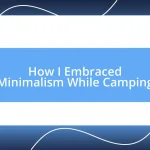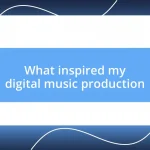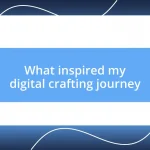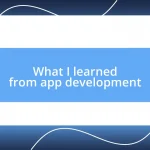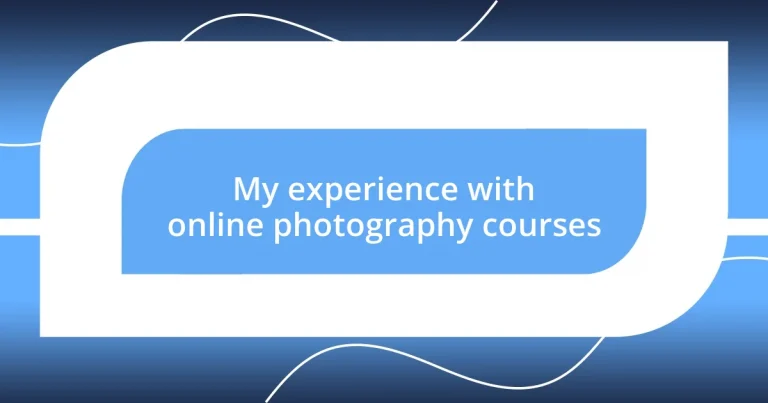Key takeaways:
- Online photography courses offer flexibility, diverse resources, and a supportive community, enhancing the learning experience for students.
- Key features of effective courses include constructive feedback, hands-on projects, and a sense of community, fostering personal growth and creativity.
- Recommended platforms like “MasterClass,” “CreativeLive,” and “Udemy” cater to different learning styles, offering valuable insights and interactive experiences.
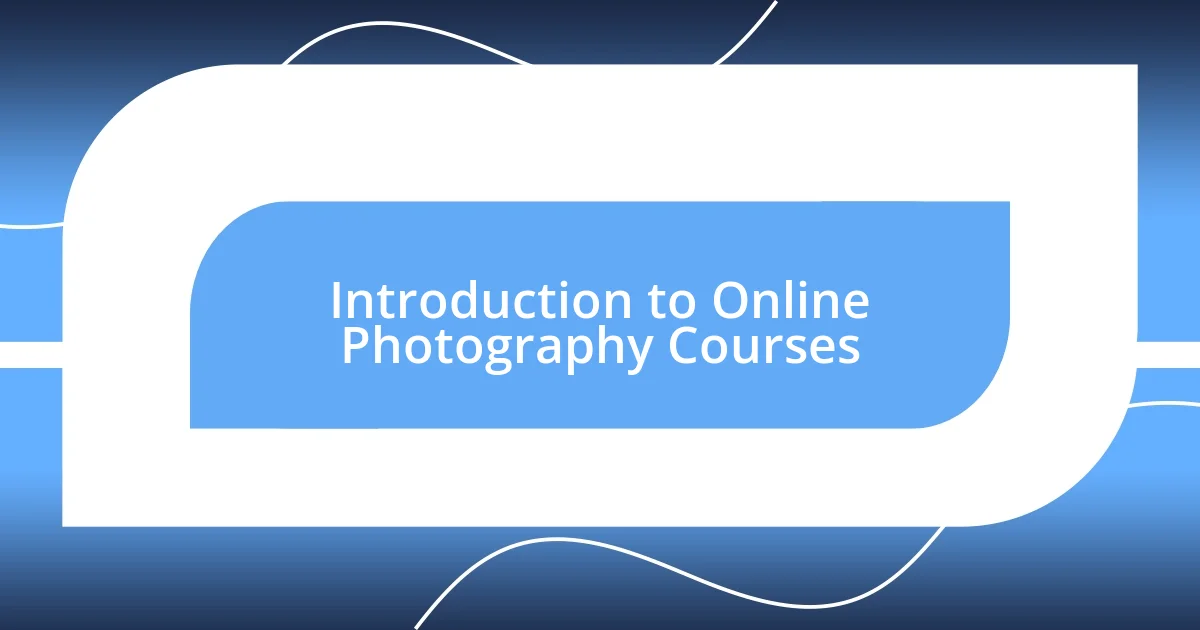
Introduction to Online Photography Courses
Online photography courses have transformed the way we learn this beautiful art form. I still remember the excitement of signing up for my first virtual class; it felt like unlocking a world of creativity right from my living room. Isn’t it amazing how technology connects us to expert instructors from around the globe, all while we sip our coffee in pajamas?
One of the standout features of these courses is the flexibility they offer. I often found myself revisiting lessons late at night, my camera by my side, inspired to try new techniques immediately. Have you ever felt the thrill of learning something new and putting it into practice? That immediate application made my learning experience so much more enriching and personal.
Moreover, the community aspect of online photography classes adds another layer of depth. Engaging with fellow students through forums or social media can be incredibly rewarding. I recall sharing my work online and receiving constructive feedback that fueled my passion. Isn’t it wonderful how sharing our creative journeys can foster connections and inspire growth?
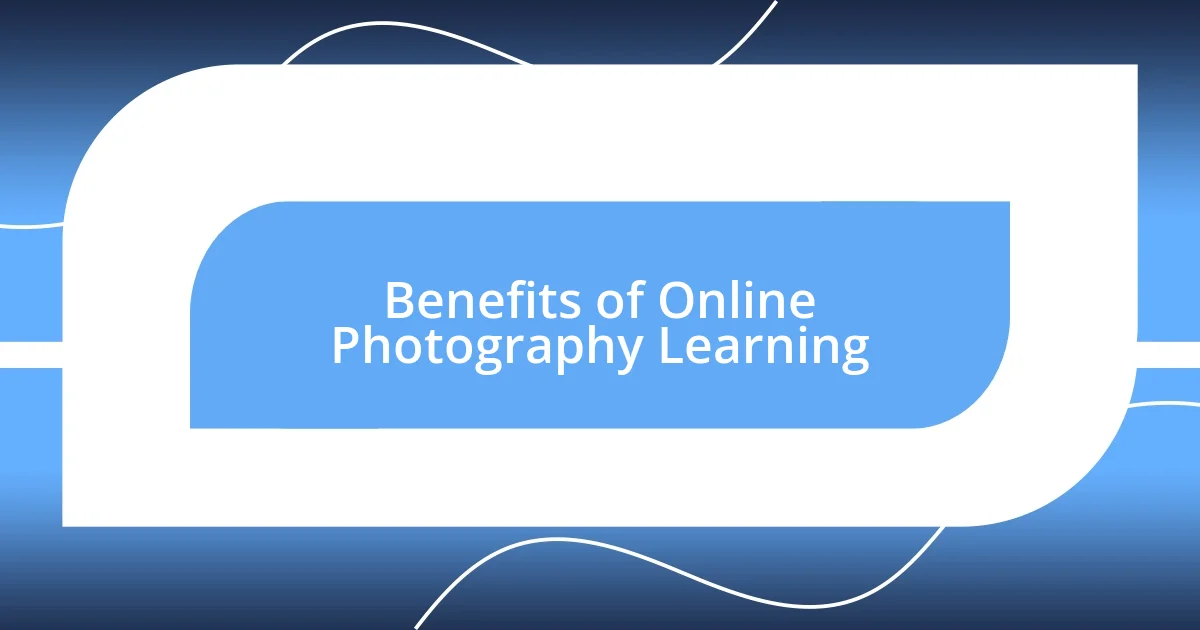
Benefits of Online Photography Learning
One of the most significant benefits of online photography learning is the vast array of resources available at our fingertips. I remember diving into an online library filled with thousands of tutorials, articles, and videos; it felt like having a treasure trove of knowledge accessible whenever inspiration struck. This wealth of information not only enhances technical skills but also ignites creative ideas, pushing us to explore different styles and genres.
Here are a few key advantages I found particularly valuable:
- Diverse Learning Materials: Access to a variety of formats—videos, articles, and interactive workshops—caters to different learning styles.
- Self-Paced Learning: The ability to learn at my own pace allowed me to spend extra time on topics I found challenging, like mastering manual settings or experimenting with composition.
- Global Perspectives: Engaging with instructors and peers from various cultures expanded my artistic viewpoint and introduced me to techniques I might never have encountered otherwise.
- Cost-Effective Solutions: Compared to traditional classes, online courses often come with lower fees, making quality education more accessible to everyone.
Another undeniable perk is the ability to forge connections in a digital landscape. I fondly recall participating in group critiques where we shared our photos and ideas in a safe space. That sense of community propelled my growth; the encouragement and insights from fellow budding photographers were truly priceless. Having such a supportive network can really amplify the learning experience, reminding us that we’re all on this creative journey together.
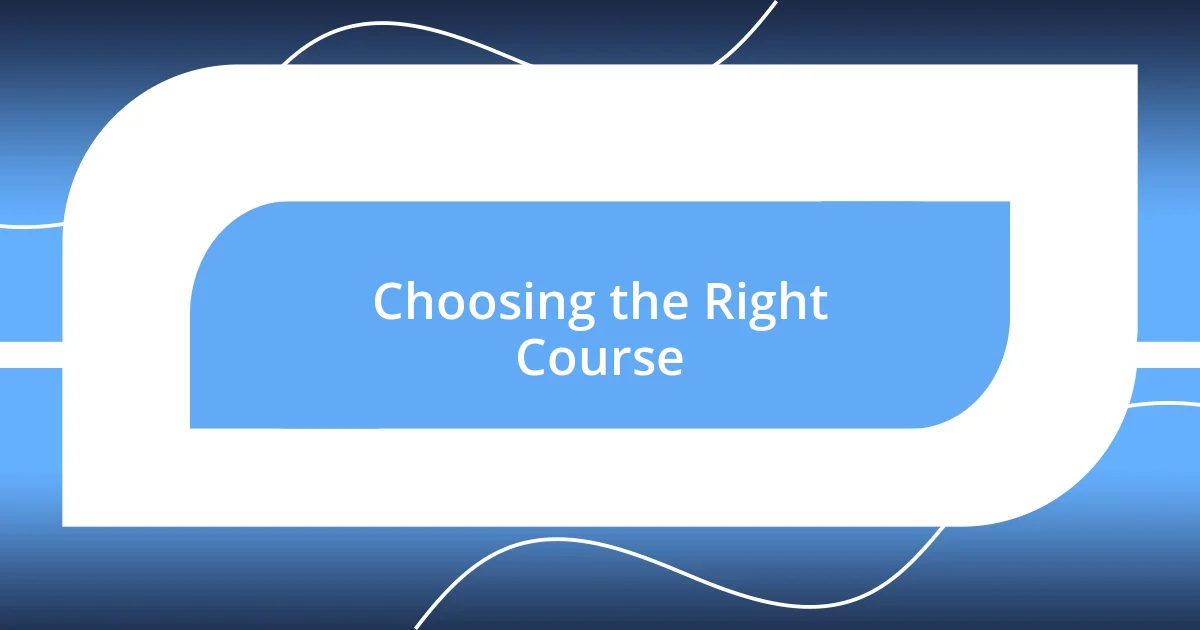
Choosing the Right Course
Choosing the right online photography course can feel overwhelming due to the plethora of options available. I remember spending hours sifting through countless course descriptions and reviews, trying to pinpoint what would resonate most with my learning style. It’s essential to reflect on what you aim to achieve: Are you a beginner looking to grasp the basics? Or perhaps you’re an experienced shooter wanting to refine specific techniques?
From my experience, reading reviews and testimonials helped immensely. I found that courses with a detailed syllabus and sample lessons provided a clearer picture of what to expect. Don’t underestimate the value of a free trial or introductory lesson—it’s a fantastic way to gauge the instructor’s teaching style and your compatibility with the content. Remember that this journey is personal; what works for one person may not work for you.
Lastly, consider your budget and the course format. Some platforms offer live interaction with instructors, which I found incredibly beneficial, while others are self-paced and may suit those with a busy lifestyle. Ultimately, choose a course that aligns not only with your financial situation but also with your learning preferences. Trust me, investing time in choosing the right course pays off when it comes to your growth as a photographer.
| Criteria | Considerations |
|---|---|
| Course Level | Beginner, Intermediate, Advanced |
| Learning Goals | Technical Skills, Artistic Exploration, Genre Specialization |
| Format | Live Classes, Pre-recorded Lessons, Hybrid Opportunities |
| Community Support | Forums, Critique Groups, Peer Feedback |
| Budget | Price Range, Discounts, Payment Plans |
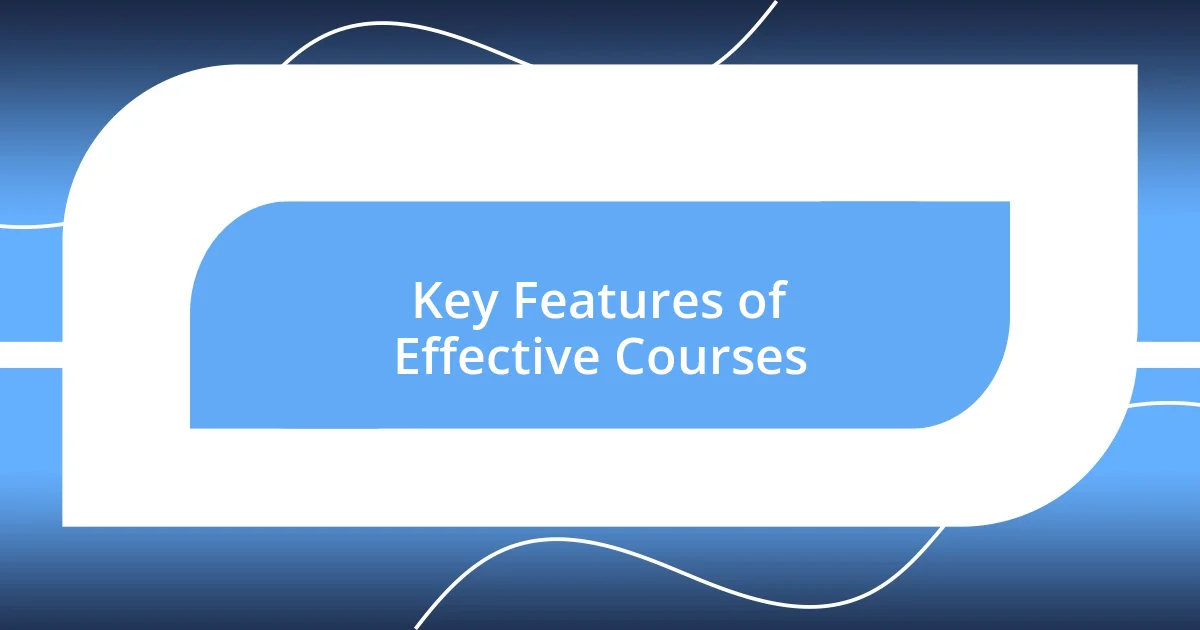
Key Features of Effective Courses
One key feature that I found essential in an effective online photography course is the quality of feedback provided. I’ll never forget my first time submitting a photo for critique in an online forum. The thoughtful comments from both the instructor and fellow students not only highlighted areas for improvement but also celebrated the unique aspects of my work. This kind of constructive criticism transforms learning into a collaborative experience where every comment becomes an opportunity for personal growth.
Another significant aspect is the availability of hands-on projects. In my experience, courses that included practical assignments made a world of difference. Assignments that encouraged experimentation with different techniques made the learning process fun and engaging. Have you ever felt that rush of excitement when you try something new and it actually works? That feeling solidified my understanding far more than passive lessons ever could.
Lastly, an effective course should foster a sense of community. When I participated in group challenges, it felt like I was part of something bigger. The camaraderie among peers not only motivated me to push my boundaries but also created lasting friendships. How often do you find yourself thriving in an encouraging environment? I believe that sharing our journeys and struggles in a supportive space can make the learning experience not just educational but also deeply fulfilling.
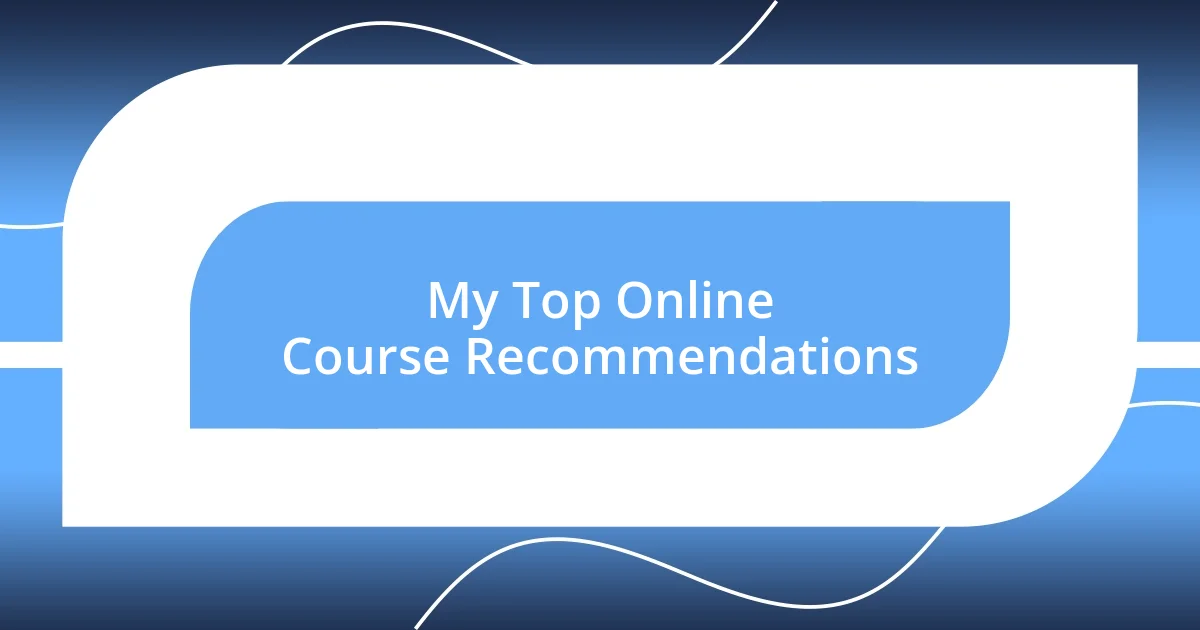
My Top Online Course Recommendations
I’ve taken quite a few online photography courses, and if I had to recommend just a couple, they would be “MasterClass” with Annie Leibovitz and “CreativeLive.” What struck me about Annie’s course was her storytelling approach. I remember watching her lessons and feeling as though she was sharing secrets from the world of photography that only someone of her caliber could tell. The way she framed each shot inspired not only technique but also an emotional connection to the art.
“CreativeLive” is another gem in my experience, especially for more hands-on learners. I remember diving into a course focused on portrait photography and being captivated by the interactive assignments. The live feedback during sessions made me feel alive; it was like being in a studio with fellow photographers, sharing ideas and critiques. Have you ever experienced that rush when your work is acknowledged and improved upon by others? That connection fosters not just learning, but a sense of belonging.
Lastly, for those who appreciate flexibility, “Udemy” surprised me with its range of affordable options. I took a course on night photography there that allowed me to learn at my own pace. It reminded me of those evenings spent wandering with my camera; I could pause, reflect, and go back to the lessons as needed. How often do you find freedom in choosing when and how you learn? That tailored experience was invaluable for mastering the art of capturing those stunning night landscapes.

Conclusion and Final Thoughts
Reflecting on my journey through online photography courses, I realize how crucial it is to balance theory and practice. I remember sitting in my living room, camera in hand, implementing what I learned about composition during a live workshop. That moment was exhilarating! It reinforced how hands-on learning can ignite creativity and deepen understanding, making the entire experience more memorable.
Equally important, though, was the sense of accomplishment that came from overcoming challenges along the way. Have you ever tackled a project that seemed daunting at first but eventually became a source of pride? I can still feel the butterflies in my stomach when I submitted my final portfolio for review. The affirmation I received not only boosted my confidence but also enhanced my love for photography.
Ultimately, investing time in online photography courses has been one of the most rewarding decisions I’ve made. The combination of community support, practical assignments, and insightful feedback transformed my skills and perspective. I can’t help but wonder how many others might embark on a similar journey and discover not just their talent, but their passion within the world of photography.
